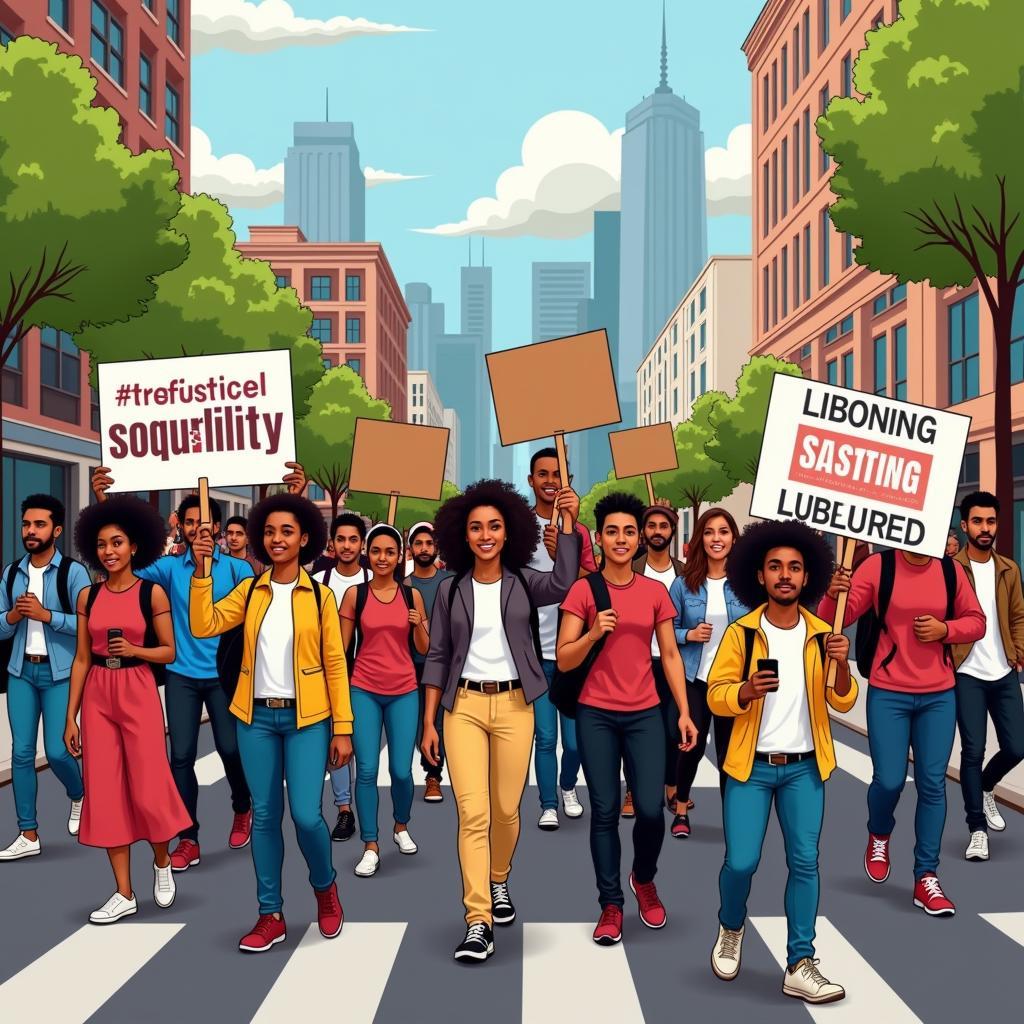Living in an Imperfect Society is a universal human experience. From systemic inequalities to personal conflicts, we are constantly confronted with the flaws and shortcomings of the world around us. This article explores the complexities of navigating an imperfect society, offering insights into understanding its challenges and finding pathways to peace and positive change.
Understanding the Nature of an Imperfect Society
Imperfection is inherent in any human construct. Societies, being complex networks of individuals with varying perspectives and needs, are naturally prone to flaws. These imperfections can manifest in various forms, such as social injustice, economic disparity, political polarization, and environmental degradation. Understanding the root causes of these issues is crucial to addressing them effectively. For example, historical biases and power imbalances can contribute to systemic inequalities that perpetuate an imperfect society. One approach to addressing these issues is through education and awareness, empowering individuals to recognize and challenge these injustices. Another crucial aspect is promoting empathy and understanding across different groups, fostering a sense of shared humanity and collective responsibility. We sometimes yearn for a utopian vision of a perfect society, as described in Society’s Perfect Woman. However, accepting the reality of imperfection is the first step towards building a more just and peaceful world.
 People protesting for social justice in an imperfect society
People protesting for social justice in an imperfect society
The Impact of Imperfection on Individuals and Communities
The imperfections of society have profound consequences for individuals and communities. They can lead to feelings of alienation, frustration, and powerlessness. Furthermore, these imperfections can create barriers to opportunity and hinder personal growth. For instance, limited access to education or healthcare can significantly impact an individual’s life chances, perpetuating cycles of disadvantage. Similarly, discrimination and prejudice can marginalize entire communities, creating social divisions and hindering progress. This can also lead to increased stress and anxiety, impacting mental well-being. Recognizing the interconnectedness of individual and societal well-being is essential for creating a more supportive and inclusive environment. We can seek to understand how societal structures, even seemingly small details like the patterns found in society social grasscloth wallpaper, can reflect and reinforce existing inequalities.
How can we cope with living in an imperfect society?
Acknowledging the reality of imperfection allows us to develop coping mechanisms and cultivate resilience. Focusing on personal growth, building strong relationships, and engaging in meaningful activities can provide a sense of purpose and stability amidst external challenges.
Finding Peace and Fostering Positive Change in an Imperfect World
Despite the challenges, finding peace and fostering positive change in an imperfect society is possible. This requires a multi-faceted approach that involves individual action, community engagement, and systemic reform. Individual actions, such as practicing mindfulness, cultivating compassion, and engaging in acts of kindness, can contribute to a more peaceful and harmonious environment. Furthermore, actively participating in community initiatives and advocating for social justice can create a ripple effect of positive change. It’s important to recognize that even small actions, such as understanding the nuances of arcane society in order, can contribute to a greater understanding of social dynamics.
What are some practical steps towards building a better society?
Promoting dialogue and understanding across different groups is crucial for bridging divides and fostering collaboration. Supporting organizations and initiatives that address social issues and advocate for equality can create lasting change. Finally, holding our leaders accountable and demanding policies that promote justice and fairness are essential steps towards building a better future. By understanding reviews, such as those found in the beauty society reviews, we can gain insights into the values and priorities of different groups within society.
“We must not be discouraged by the imperfections of our society, but rather inspired to work towards a more just and equitable world,” says Dr. Anya Sharma, a renowned sociologist. “Every small act of kindness, every voice raised against injustice, contributes to the collective effort of building a better future.”
Conclusion
Navigating an imperfect society is a continuous journey that requires resilience, compassion, and a commitment to positive change. By understanding the root causes of societal imperfections, cultivating empathy, and engaging in constructive action, we can create a more just and peaceful world for ourselves and future generations. Even in the face of adversity, hope and determination are powerful forces for transformation. Remember, the pursuit of a more perfect society is a collective endeavor, and every contribution, no matter how small, makes a difference. Further insight can be found in resources such as the burnout society pdf, which helps us understand the pressures and challenges individuals face in our modern world. Let us embrace the imperfections, learn from them, and work together towards a brighter future.
FAQ
- What is an imperfect society?
- How do societal imperfections affect individuals?
- What are some examples of societal imperfections?
- How can we promote peace in an imperfect society?
- What role does individual action play in creating positive change?
- How can we address systemic inequalities?
- What are some resources for learning more about social justice?
Situations and Related Questions:
- Scenario: Feeling overwhelmed by the negativity in the world.
- Question: How can I maintain hope and stay positive when faced with societal imperfections?
- Scenario: Witnessing injustice in your community.
- Question: What steps can I take to address the issue and promote change?
- Scenario: Feeling powerless to make a difference.
- Question: How can I contribute to building a better society, even with limited resources?
Further Exploration:
For more information on related topics, please explore other articles on our website related to social justice, community building, and peace activism.
Call to Action:
For support and further information, please contact us:
- Phone: 02043854663
- Email: [email protected]
- Address: Khu 34, Bac Giang, 260000, Vietnam
Our customer service team is available 24/7 to assist you.